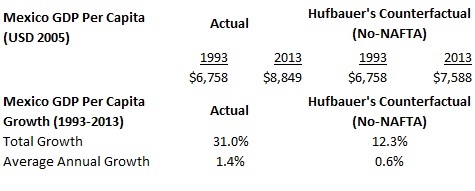General Discussion
Related: Editorials & Other Articles, Issue Forums, Alliance Forums, Region ForumsNAFTA Advocates Continue to Make Misleading Claims
https://www.commondreams.org/view/2014/07/18-7
A protestor at Peace Arch Park opposes the U.S.-led Trans Pacific Partnership agreement (TPP), which has been called "NAFTA on steroids." (Photo: flickr/cc/Caelie_Frampton)
n an effort to defend NAFTA and promote similar agreements, the Peterson Institute for International Economics (PIIE) – Washington’s most influential think tank on international economic policy – had a full day of events Tuesday. The program highlighted one of their recent publications [pdf], which seeks “not to rehash old claims that may have been overstated but to clear the air so that the benefits and challenges of trade can be examined in an objective light.” In spite of this disclaimer, the authors grossly overstated the benefits of NAFTA for Mexico, and put forward a number of misleading claims, including a particularly egregious bait-and-switch used to justify a rant against the economic policies of the “Andean-3” aka Bolivia, Ecuador and Venezuela. It is a good example of how ideology can trump facts when it comes to commercial agreements made in Washington.
Earlier this year, CEPR published a paper giving an overview of the Mexican economy in the NAFTA era (“Did NAFTA Help Mexico? An Assessment After 20 Years”), so I will focus here on the claims made about Mexico by the PIIE economists. In terms of their bottom line for Mexico, the authors’ findings concur with our conclusions. They say that “Mexican growth in the NAFTA era has been disappointing.” But they also argue that without NAFTA Mexico’s economy would be $170 billion smaller. In other words, they attribute half of Mexico’s (per capita) growth rate to trade in goods and services stimulated by NAFTA (see table below.) Given Mexico’s population (about 118 million), this amounts to a payoff of $1,441 per person, or about $4 per day. In a country where over 27 percent of the population lives on less than $4 a day – in rural areas it is over 48 percent of the population – this would be very significant. In reality, results such as these are produced by economic models that are highly sensitive to parameters which the researchers themselves determine, so it is easy to end up with results that corroborate one’s worldview.

According to Hufbauer’s estimations (above), Mexico’s growth performance – which ranked 18th out of 20 Latin American economies during the past 20 years – would have been less than half its actual abysmal performance without NAFTA. This is a bit tough to swallow. How badly can an economy like Mexico’s perform, when the rest of the region, including the U.S. economy is growing? And if that is the baseline, what does it say about what else is wrong with the Mexican economy? After all, NAFTA was mostly a continuation of policies adopted in the decade prior to the agreement.
The author of these conclusions is Gary Clyde Hufbauer, a name with which anyone who has done research on NAFTA will likely be familiar. For example, in 1993 he wrongly predicted that NAFTA would expand the U.S. trade surplus with Mexico. At the time, he was widely cited in the news media and by those who supported signing the deal. Under NAFTA, the opposite happened as the U.S. surplus turned into a growing deficit. He also said that NAFTA would “lead to long-term growth in Mexican per capita income,” eventually reaching “half of the U.S. level, a gain that substantially would ease illegal immigration to the U.S.” Instead, Mexico’s growth rate slowed, its unemployment level worsened, and immigration soared in the years following NAFTA (until post 9/11 border restrictions and two recessions, including the Great Recession, dampened it).
pipoman
(16,038 posts)about this rivaled the Bush lies about WMD. NAFTA cheerleaders have still to acknowledge the lies. .look at Robert Reich, he writes almost daily about the US economy, he literally blames everything but NAFTA, which he, to this day, defends...I guess why wouldn't he, he sold out labor for his own benefit as secretary of labor against the wishes of over 80% of labor.
The only way NAFTA could have possibly produced the results promised is if the agreement had included a mandate on all participating nations to impose worker and environmental parity with the first world in a time certain. Without such a requirement these results were crystal clear to anyone not blinded by the prospect of vast personal gain from the exploitation of 3rd world labor. 100% of the gains made by Mexico went to their corrupt government leaders, corrupt government leaders in the US, and the multinational corporations who purchased the agreement from the corrupt leaders in both countries. History will likely not be so kind to those leaders, but alas, they will enjoy the fruits of the stolen US economy during their despicable lives. ..three cheers for another Clinton in the White House!1!! 1
Populist_Prole
(5,364 posts)I've come to notice the only way agreements like NAFTA and the like look "good", either in foresight or hindsight, is in the abstract macro/technocratic sense. Never the empirical real-world sense.
While we know it's been a boon to the one percent, the speciousness of figures supposedly on our side who push this garbage is unforgivable.